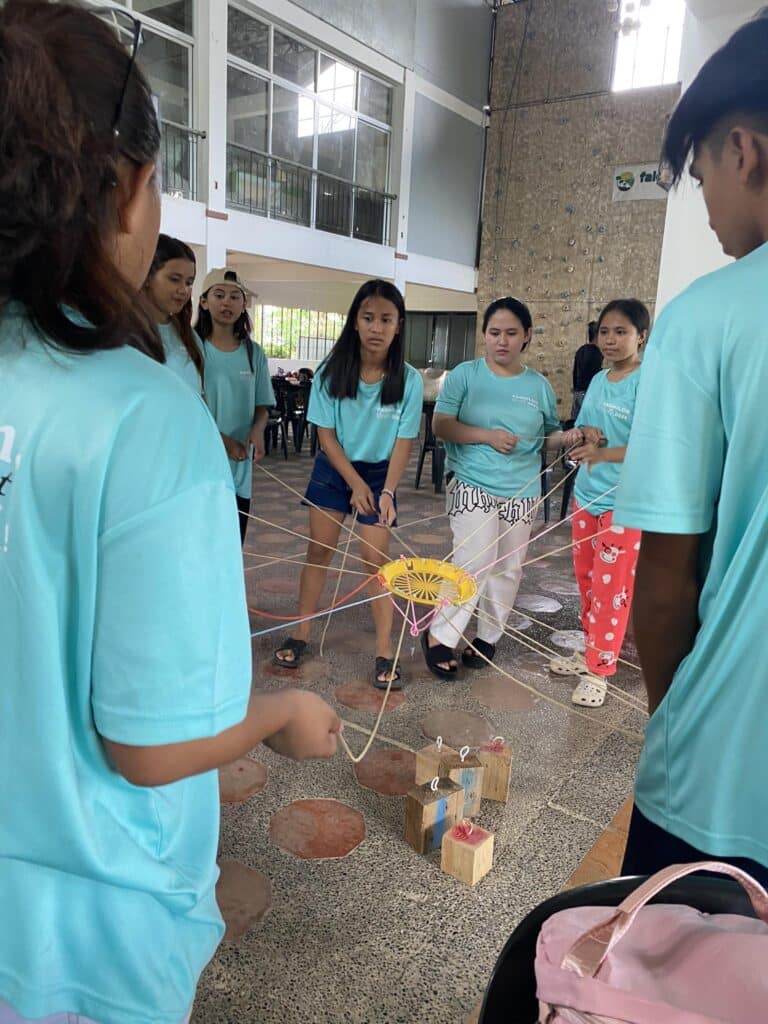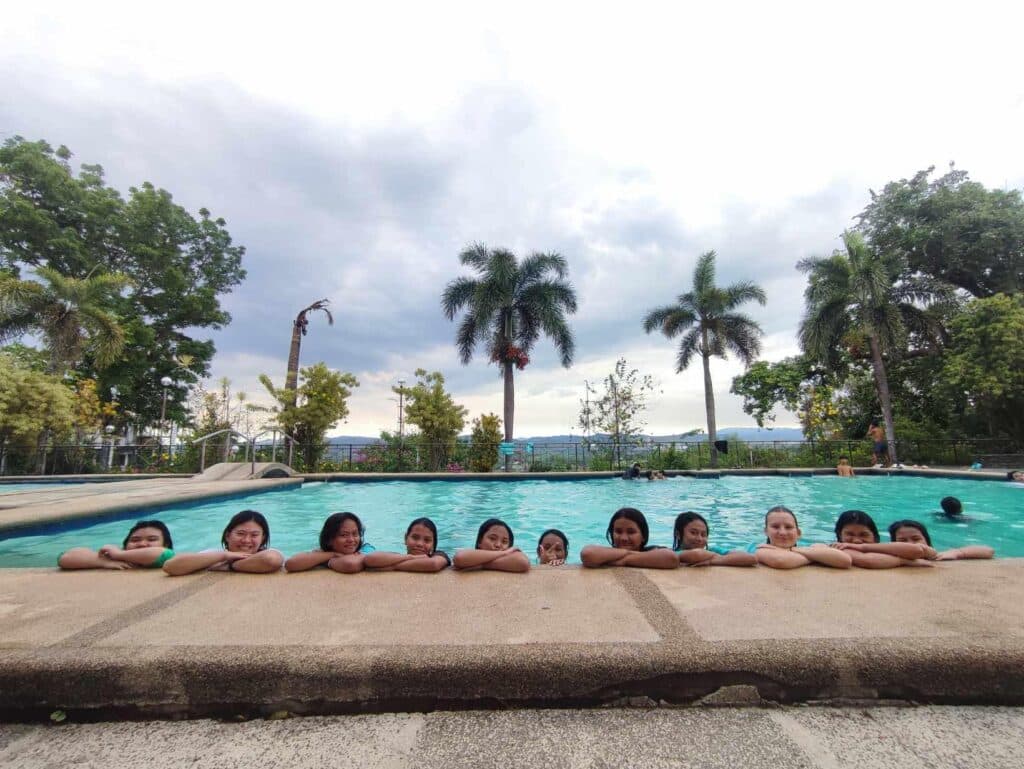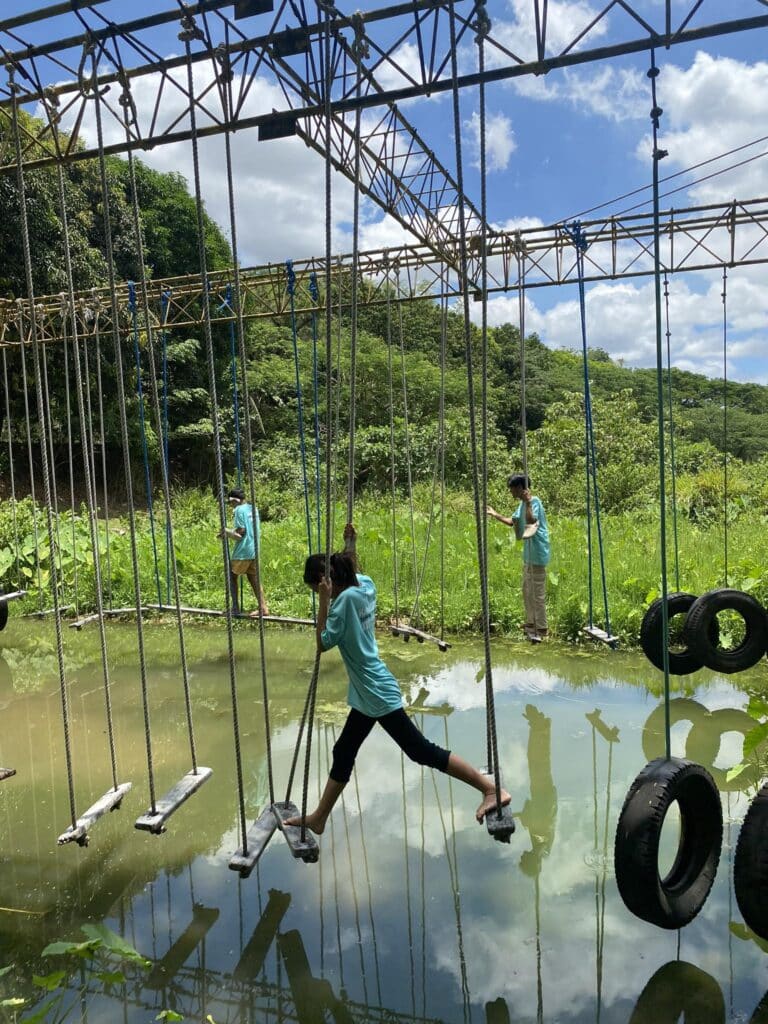By Tin Bartolome
“Para magkaron ng bagong kaibigan” (To find new friends);
“Para makipag-bonding” (To bond with others);
“Para makakain” (To be able to eat)…
These were just some of the responses we got from the EJK youth and orphans who joined Program Paghilom’s second youth camp, held on May 17-19. These reasons, especially the third one, are all candid and poignant but may not mean much to those used to comfortable lives. These could, however, be an eye-opener as regards the realities of the drug war’s most vulnerable victims.
Twenty-five young people, aged 13 to 24-years old joined the first youth camp for the year at Ciudad Christhia in nearby San Mateo, Rizal on March 22 – 24. UP Psychology Professor Jay A. Yacat designed the modules of the camp, which carried the theme “Pakikipagkaibigan” (Friendship). I was surprised by their response to the activities prepared for them. From the self-introduction activity to personal boundaries, and even planning their future—the girls, most especially were eager and willing to share. I also saw how much they needed to move—to play ball, to swim, and to have fun.
Connections established
The camp, as expected, was not without challenging situations. One 14-year old had the team on edge as he engaged in all sorts of attention-getting behavior. I felt deep-seated anger in his heart as I asked him about his daily activities, his thoughts on what we were doing, and most especially, his family.
Generally, the boys in the group were mostly shy and some simply played basketball every chance they got. As expected, the swimming pool drew all of them in like a magnet, so we included swim time in the daily schedule.

Meanwhile, on May 17-19, the Paghilom team welcomed 27 youth to the second youth camp themed “Establishing Connections”, held at the Falcon Crest Resort in Norzagaray, Bulacan, this time with Prof. Yacat himself as lead facilitator. To us “oldtimers”, there were many familiar faces. There were some whose looks may have changed because they have matured. They made their own rules, and many said they enjoyed the mindful walking exercise. The venue also allowed them to pick fruits to eat, so they had mangoes and duhat aplenty!
Trauma + stigma
Kids grow up so fast— so do our Paghilom youth. I sometimes feel that we facilitators need a lot of catching up to do. I am awed at how much I learn from them, how inspiring they can be, and how they provide countless reasons for me to learn even more.
It is so easy for the older generation to assume that they need to “teach”—to fill seemingly empty cups. But reality—plus a good dose of humility—tell us that being older does not necessarily mean knowing more. Do we really know better?
Many of these young people come from families so different from ours. For some of them, daily struggles are unimaginable—and added to these struggles are the trauma and stigma of losing their loved ones.
A few years ago, in the days when the widows and victims’ mothers were allowed to bring a child or grandchild to our retreats, a boy (whose father was an OFW) told another child (whose father was a victim), “Tatay mo, adik! Tatay mo na-tokhang! (Your father was an addict! Your father was a Tokhang case!)” The latter tried to fight back but was visibly distressed and in tears.
‘Peace of mind’
For 19-year old Lovely Ramos, who joined the second camp, the activity helped her and her fellow EJK youth have “peace of mind.” She said, “Bilang isang orphan na may trauma sa nangyari sa aking mga magulang, ako ay nagpapasalamat sapagkat napakalaking tulong ito sa akin ang camp… Napakarami kong natutunan.” (As an orphan who has trauma because of what happened to my parents, I am thankful because the camp is such a big help to me…I learned so much.)

Today, we do not ask our youth who among them experienced bullying. We talk about it only when they mention it. At camp, another form of bullying happens: the quieter ones are sometimes made the butt of jokes or are discriminated against, often ending up in a separate table, or in chairs far from the larger group. We take note of these details, but gently nudge them to join the group, while asking the others to help make them more comfortable.
Confidence in God & in oneself
According to Lovely, who lost both of her parents in 2016, her favorite topic during the camp was the one about having self-confidence. She explained: “Sapagkat minsan ako ay nawawalan ng confidence sa sarili, lalo na ‘pag may nagsasabi sa akin na “Hindi mo naman kaya ‘yan.’ …Kaya ngayon, unti-unti ko natutunan na dapat gawing motivation ang mga sinasabi nila.” (Sometimes, I lose confidence in myself, especially when someone says, ‘You won’t make it’…That’s why now, I’ve been slowly learning to turn their words into my motivation.)
…Minsan ako ay nawawalan ng confidence sa sarili, lalo na ‘pag may nagsasabi sa akin na “Hindi mo naman kaya ‘yan.’ …Kaya ngayon, unti-unti ko natutunan na dapat gawing motivation ang mga sinasabi nila.”
These young people have so much potential. Having survived the odds, some are even flourishing. Quite a few are academically gifted, while others excel in sports and dance; some are able to balance work and studies well. All of them are creative, and there are strong indications that they are resilient. Their resilience is extraordinary: with a little help, it can be transformative. This means that whatever their situation, they do not merely adjust or adapt to survive, they find ways to thrive.
For Lovely, the strategy is quite simple, “Magdasal palagi at magtiwala sa Panginoon at sa sarili.” (Just pray always and trust the Lord and yourself.)

